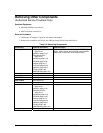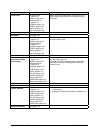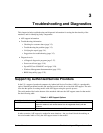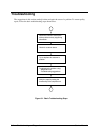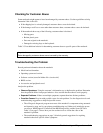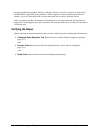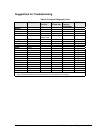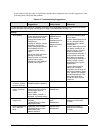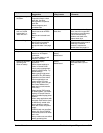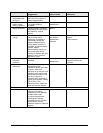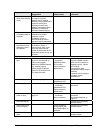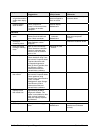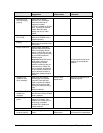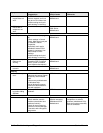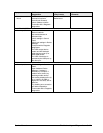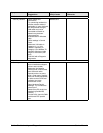
Service Manual Troubleshooting and Diagnostics 3-7
Symptom Call Center:
Suggestions
Repair Center:
Likely Causes
Repair Center:
Comments
Sluggish startup or
shutdown.
Use Tools tab in disk’s
Properties sheet to check
hard disk. Use Disk
Defragmenter to optimize
hard disk.
Delete temporary and
unneeded files.
Hard drive.
Error message
such as “Invalid
system disk” or
“Auto IDE error”.
Check for disk in floppy drive.
Check boot order in BIOS
Setup.
Remove and reinstall hard
drive.
Hard drive contacts.
Hard drive.
If notebook boots from floppy
drive, check for corrupt files
on hard drive, use Recovery
CDs to reinstall factory
software onto hard drive,
replace hard drive.
Password forgotten. Verify proper ownership, then
follow removal procedure
with owner and record
appropriate data—see page
5-1.
User must call Technical
Support and provide proof of
ownership. Password
removal is restricted to
certain sites. See page 5-1.
Power
No power. Make sure charged battery is
installed or AC adapter
connected.
Try another battery or AC
adapter if available.
AC adapter.
Battery.
Motherboard.
Notebook has short
operating time
when on battery.
Turn down display
brightness.
Check timeout settings in
Power in Control Panel.
Check power management
settings in BIOS Setup. Try
default settings.
Battery gauge might need
calibration. Run HP Battery
Optimizer from Start menu.
Certain applications can
cause excess CPU and
power usage. (User can get
Intel Power Monitor from
www.intel.com and monitor
CPU load.)
When playing DVD movies
on battery power, use Power
Options in Control Panel to
select Portable/Laptop power
scheme.
When using applications with
automatic save feature (such
as MS Word), extend save
time or disable to reduce
hard disk access and power
usage.
PCMCIA card use can affect
battery life. Some PCMCIA
cards draw power even while
not in use.
Heavy modem use can affect
battery operating time.
Battery.
Motherboard.
Battery capacity often
decreases after a year or
more.



